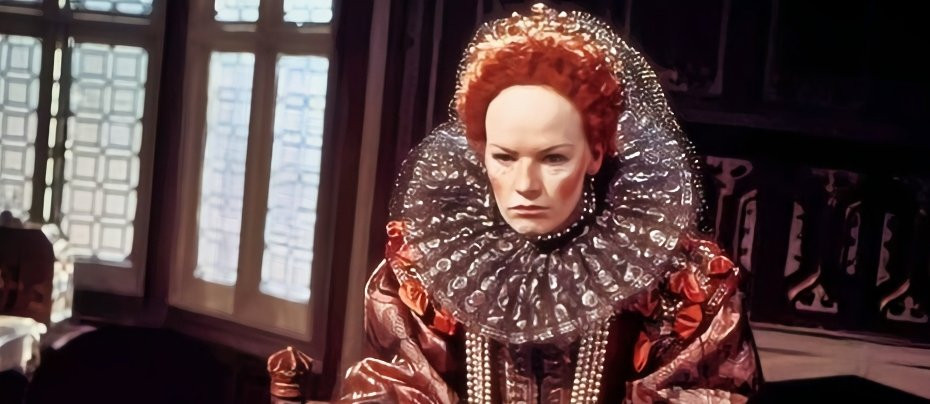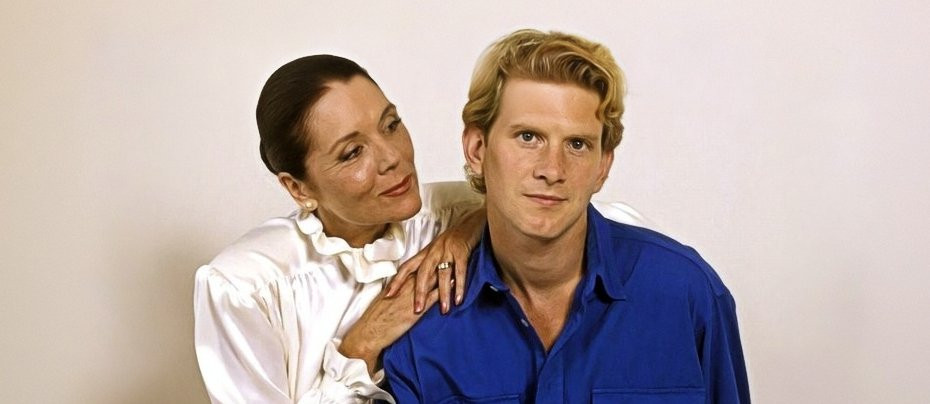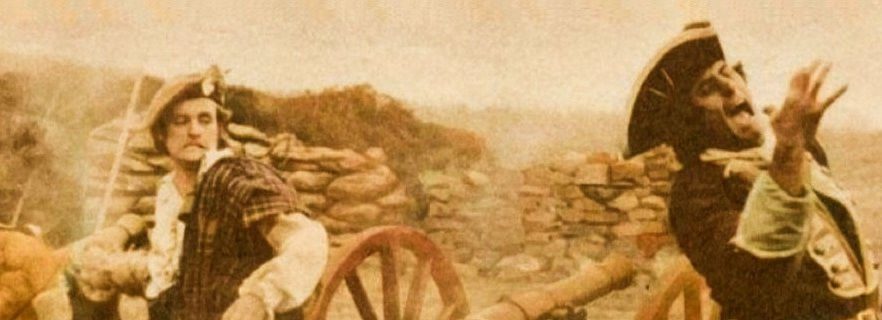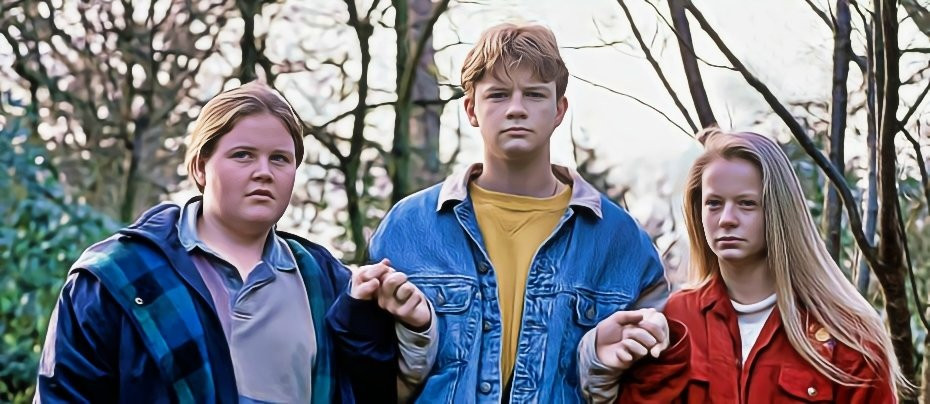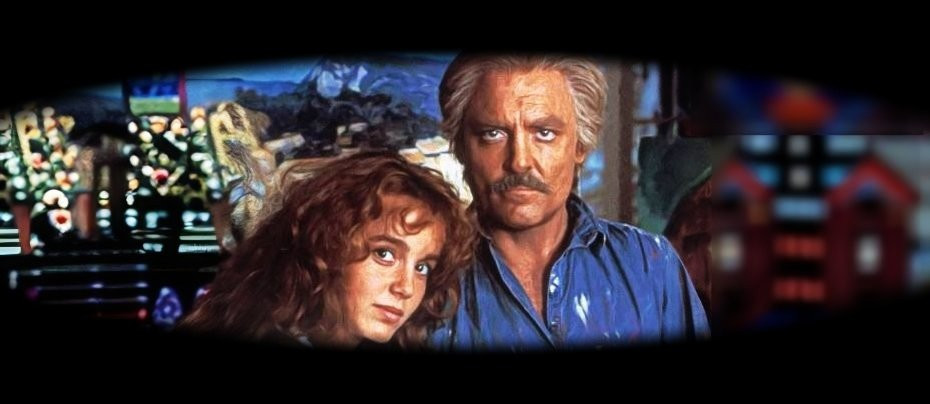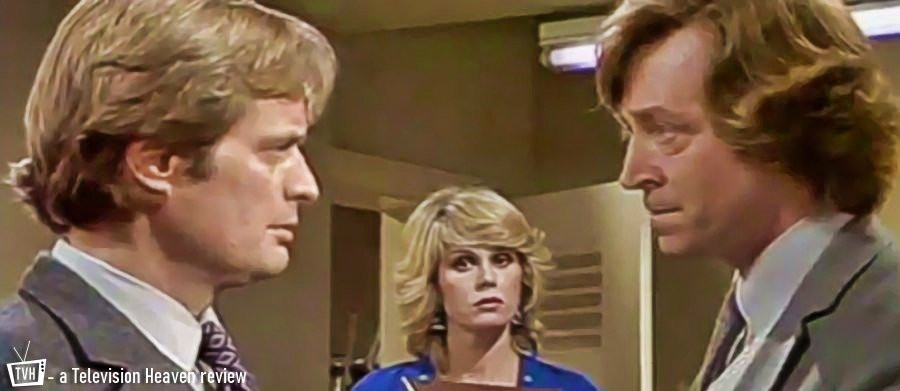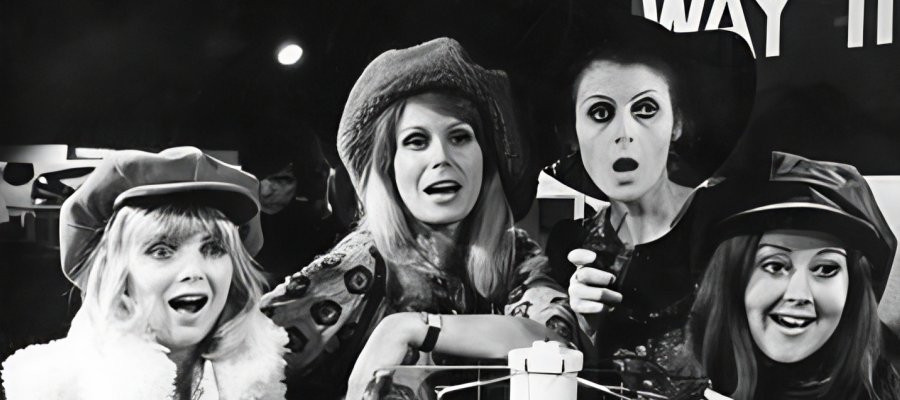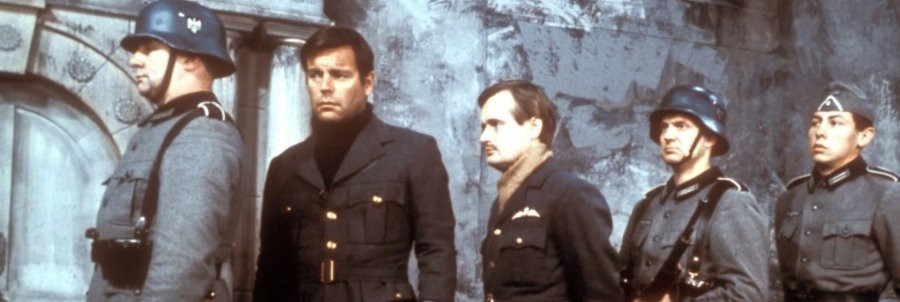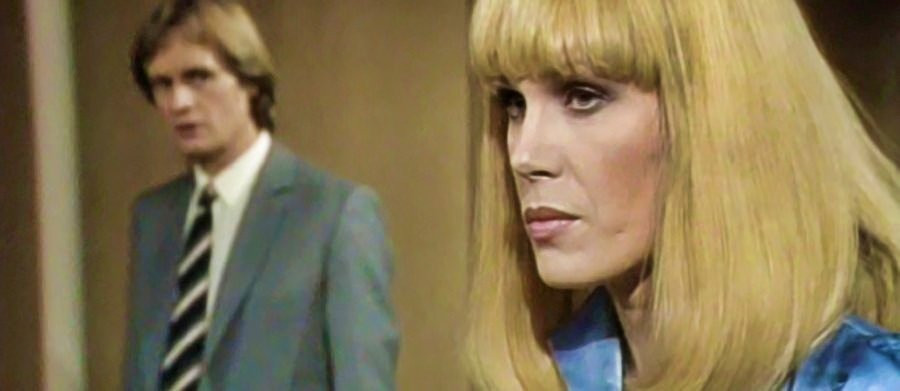
Sapphire & Steel - Assignment Three
Sapphire & Steel returned for a second series in early 1981, once again for a run of two serials. Unfortunately, the first of the two stories are pretty much universally regarded as the weakest of the programme. That's not to say the serial has nothing to recommend it, and it certainly boasts some of the strangest ideas the series has to offer. It also introduces the most significant secondary character in the programme: Silver, played by the late David Collings, another of the elemental agents from the unknown and unknowable organisation that sends Sapphire and Steel to deal with trouble in time.
Both this and the following serial are set in and around a flat, a perfectly ordinary environment which is unnerving due to its sheer familiarity. Many viewers must have watched the third story in a regular high rise block just like the one in which it's set. The great strength of the programme is its way of making the mundane somehow otherworldly and terrifying. However, while Assignment Three does its best to make the most mundane of settings creepy, its effects let it down. Of course, Sapphire & Steel is a famously low budget programme and its crew were frequently ingenious in making the most of limited resources. In this serial, though, the concepts test even their best efforts.
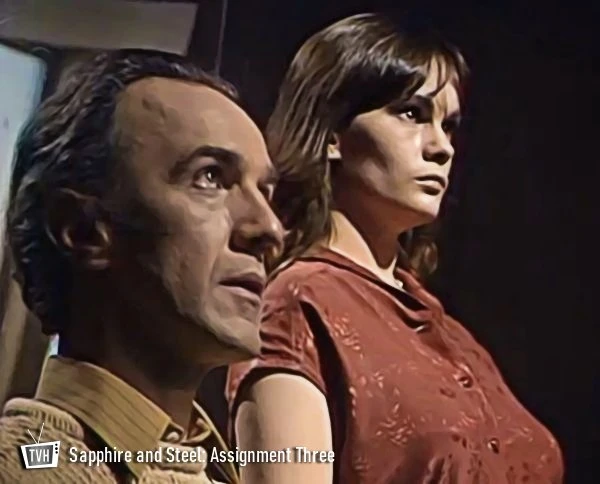
Which is a pity, because there are some fantastic concepts here. The story revolves around a group of time travellers from the 35th century, who have taken a posting in the 1980s to learn about their distant ancestors. Appearing as a somewhat sinister if outwardly unremarkable couple, Rothwyn and Eldred (Catherine Hall and David Gant) live a supposedly ordinary twentieth century life in their apartment. The physical trappings are all correct, but their names are hundreds of years out of fashion, a clear error on the part of time travellers from the future who haven't quite done enough research. While they live like ordinary people, they remain sealed away in their flat, with no one for company but their nameless baby (who they simply refer to as "the child") and an unnerving voice that instructs and informs them, emanating from a glowing light that appears on the wall of the flat.

The couple are, however, cut off from the future and the other such teams that have been placed in the present on their own research missions. They can receive instructions from the voice but have no communications with their superiors, and are beginning to become frightened. The voice and the light are only the outward aspects of a powerful force that is interfering with the structure of time, creating bizarre and nightmarish effects, not least of which is the impossibly accelerated ageing of the baby, who moves rapidly into a young child and then a grown man, but still with the mind of an infant.
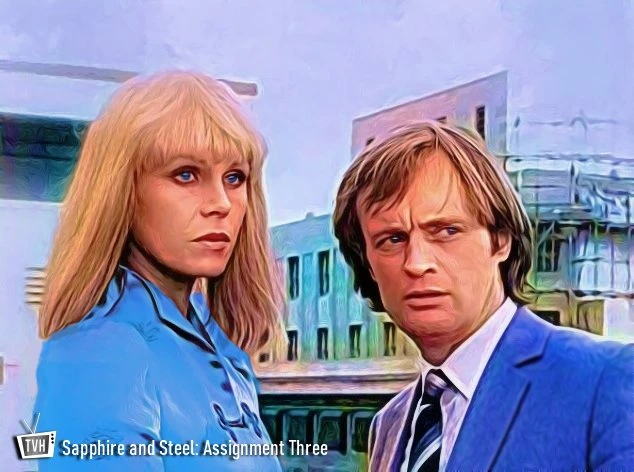
Sapphire and Steel are sent to the block to deal with the temporal effects, which could threaten the stability of the entire universe if left unchecked (it's never really explained why; we have to trust Steel on this, but he's generally right about these things). However, with the flat completely sealed off by an invisible force, the agents are unable to enter, so much of the first couple of episodes involves their trying to break in. This includes the only location filming in the series, with Sapphire and Steel trying to attack from above by breaking through the forcefield on the roof. It's actually the roof of ATV's own building, so it's not like McCallum and Lumley got much of a day out. Even though they manage to break through the forcefield, they end up in an empty decoy flat before finally making it into the real target.

It's on the roof that they're joined by Silver, another specialist like Lead. Silver is a wonderful character, a chatty, puckish and enthusiastic agent who is described as a technician. That's doing an injustice, though, for a being who boasts that he can take apart and repair any machine and has incredible powers of illusion. Silver flirts with Sapphire shamelessly, something that Collings admitted was largely down to him because he fancied Lumley so much, but it works wonderfully with the characters. Steel is in a terrible mood all through the serial, even by his standards, and having this charming specialist turn up and muscle in on his territory doesn't help matters. I get the feeling that this is as much McCallum as Steel, reacting to Collings coming in and stealing his show. He's almost a flashier version of the same character, both of them longish-haired and dressed in suits, but with Silver just that bit more dashing and well-cut. They're both quietly terrifying, as well. Steel is quite willing to destroy the entire tower block and all its inhabitants to contain the threat, while Silver's entirely unmoved by the suicide of all the other time travelling teams who have been driven to take their own life.
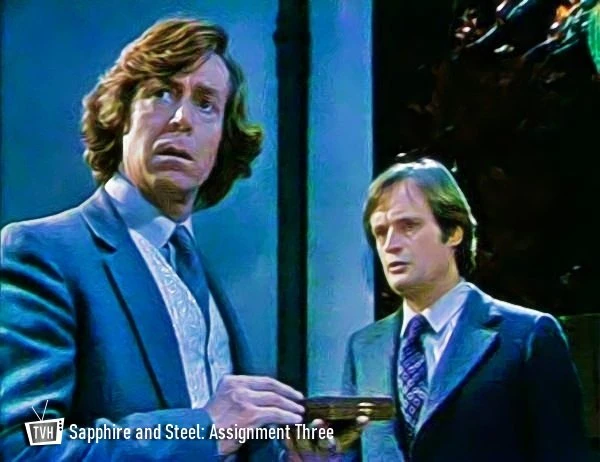
Collings is excellent as Silver, and it's not at all surprising that he was the only guest actor who returned to the programme. Known already in genre circles for guest roles on Out of the Unknown and Doctor Who, and well-regarded for regular roles in the 1969 version of The Canterbury Tales Collings was not the first choice for the role. The part had been offered to Anthony Sher (The History Man, Tartuffe, or the Imposter) who turned it down, which is fortunate. Collings is perfect in the role.
Of course, the two stars are as good as always, and Steel's foul mood lends the events a lot more gravitas than they strictly justify. We see that he has superhuman strength, and McCallum must have a bit of steel in him as well given that he was wandering along the edge of the ATV building. Lumley is captivating as Sapphire, looking amazing with a seventies bob (actually a wig) and a new Chinese-styled costume (in blue, naturally), exceptionally balancing the attention of her two fellow agents. With Silver there Sapphire ups her ribbing of Steel, teasing him about his childhood of all things ("I have very positive origins. Inexpressible, maybe, but positive.")
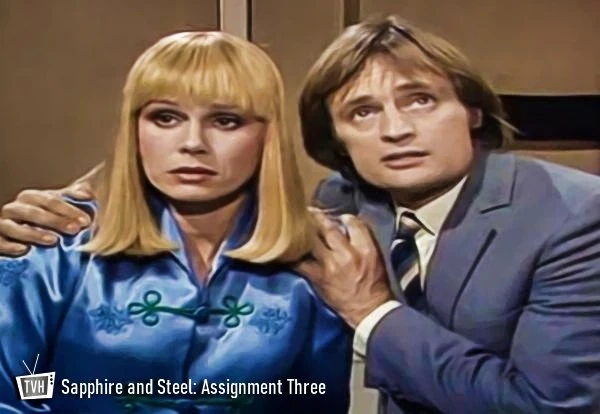
The nature of the threat becomes clear only gradually. It messes with time in increasingly strange ways, able to roll time back and forward and to revert things to their primordial states. While this is conceptually frightening, it's here that the crew struggle to create visuals to match the ideas. Some parts work well: Rothwyn undergoes a horrific vision of an abattoir when she handles a leg of lamb ("We don't mind making a study of twentieth century food, but we shouldn't have to eat the stuff.") On the other hand, we have scenes of people being attacked by pillows, which really doesn't work. The first episode ends with a cliffhanger whereupon a pillow goes for Steel, before reverting to a very unconvincing fake swan. Now, if a swan or even a pillow attacked me on a rooftop, I'd be alarmed, but it doesn't make for particularly arresting television.
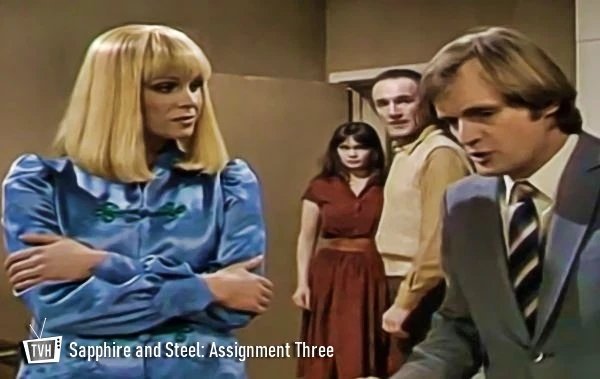
Hall gives a reasonably strong performance as Rothwyn, occasionally a bit hysterical but mostly strong, and while Gant doesn't have as much to do as Eldred he is rather good when he faces the agents later in the story. Better than either is Russell Wootton, credited as the Changeling. Playing a baby accelerated to adulthood isn't an easy task and he manages it well, giving a subtle but still quite unnerving performance. He's being controlled by the force causing the time disturbances, using him as a channel. Sapphire, unsurprisingly, manages to communicate with him to an extent, but he remains pretty unfathomable and all the more dangerous for it. Steel, in a strange moment, becomes convinced the child is a robot, and goes to open him up, getting winked out of existence for his troubles. (He gets better.)

It's eventually revealed through the dialogue with Rothwyn and Eldred that in the 35th century there is no animal life, having been wiped out in the intervening centuries. All that remains is a few elements of biological technology, "kept alive, propagating, as pieces." The interface in the flat is described initially as a time crystal, before being revealed to be one of these biological mechanisms, made from bits and pieces of all sorts of creatures. It's the source of their orders, their method for travelling in time, and the thing that has been tormenting them. Essentially it's the ghost of animal kind, out for revenge against humanity. The only glimpse we get, until the end of the story, is some kind of foetus hiding in the wall, which is suitably unsettling, but when it finally manifests it's deeply unimpressive.
It's a very polemical, a clear attack on the exploitation of animals, although it's an oddity, with that in mind, that the time travellers are vegetarians but only because they're disgusted by animals. There's nothing wrong with that, of course, but the delivery of the message is flawed. At six episodes the story is stretched out too long and becomes rather boring in places because of it. Shaun O'Riordan's direction isn't really up to the task of making this genuinely frightening, and the decision to have the serial take place entirely in daylight robs it of a lot of its atmosphere. And atmosphere, after all, is what Sapphire & Steel is all about. Still, even at its weakest, the programme boasts disturbing images and ideas, that stick in the mind long after watching.
Review: Daniel Tessier
Dan describes himself as a geek. Skinny white guy. Older than he looks. Younger than he feels. Reads, watches, plays and writes. Has been compared to the third, fourth, fifth, sixth, seventh, eighth, tenth, eleventh and twelfth Doctors, and the Dream Lord. Plus Dr. Smith from 'Lost in Space.' He has also had a short story published in Master Pieces: Misadventures in Space and Time a charity anthology about the renegade Time Lord.
Dan's web page can be here: Immaterial
Published on January 11th, 2021. Written by Daniel Tessier for Television Heaven.


